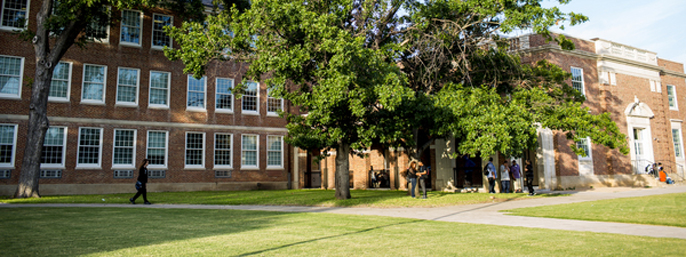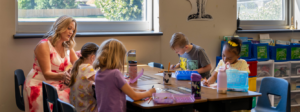On foot and by every mode of transportation, people have been moving toward opportunity, crossing borders, oceans, and hemispheres for as long as it has been possible. One of the primary reasons people immigrate to North America is opportunities related to education. That’s why my parents emigrated to Canada in 1983. Six months pregnant with me, my parents, who are from a northeast African country on the Red Sea coast called Eritrea, boarded a plane to Canada so their children would have access to high-quality education.
Our parents were so dedicated to our education that they helped us with our homework every night. They would borrow or buy next-grade-level textbooks for us to study before we started school in the fall. We had to learn to type 70 words per minute before we could go out to play with our friends, and we weren’t allowed to have a job—doing well in school was our job. When my parents found out that our neighborhood school wasn’t high-performing, we traveled 45 minutes (two buses and a 15-minute walk) every day to a better school.
Yet, if you asked my teachers about my family, they would have told you they assumed my parents didn’t value education. Why? Because they didn’t attend my fifth-grade graduation or school bake sales. What my parents were doing to support my education didn’t fit the traditional, one-dimensional profile of an engaged parent—someone who shows up and volunteers. Now, it’s my mission in life to change both how we view and how we do family and community engagement in education.

A photo of the author and her family from her childhood.
I am a member of the ATL Leadership Network team, a five-year school transformation partnership between TNTP and two Georgia school districts: Atlanta Public Schools (APS) and DeKalb County School District (DCSD). The ATL Leadership Network is at the forefront of an important shift in the focus of engagement—a shift toward engaging families and communities as the partners they are. In my role, I engage family and community committees and school leaders in professional learning, and coach these groups toward increasing shared decision-making on school priorities and initiatives that support student learning.
Our goal is to connect engagement to academics and shift the perception that learning only happens in classrooms while family and community engagement only happens in cafeterias after school. The ATL Leadership Network focuses on harnessing the collective power of educators, families, students, and community members in meaningful ways. Common goals and trusting relationships take root as school leaders and teachers see how engaging families and the community can support their academic priorities. And as families and communities understand children’s learning and how to advocate for it outside of school, a collaborative, community-based approach to sustaining school improvement takes shape.
In the context of COVID-19, for ATL Leadership Network schools and schools across the country, aspirations for engagement turned into an imperative. Overnight, schools and families turned to each other as partners; the shared responsibility of educating students intensified. This fall, in both APS and DCSD, family and community engagement were part of remote learning strategies. DCSD’s school reopening plan calls for families to have the opportunity to participate in virtual empowerment workshops to support work with students in the digital space. A key part of the APS school “care team” intervention strategy is coordinating problem-solving conversations with families to ensure students are matched to the academic, wellness, and engagement interventions they need.
This moment has served as a call to action to remove traditional barriers to family and community engagement—to expand our definition of engagement and redefine it in terms of partnership and empowerment. If my teachers had adopted this view of engagement, they would have understood what I always did: My parents were engaged, and they valued education. They invested in my academic success because they saw my successes as theirs, a validation of the sacrifices they made in pursuit of opportunity for their children.








